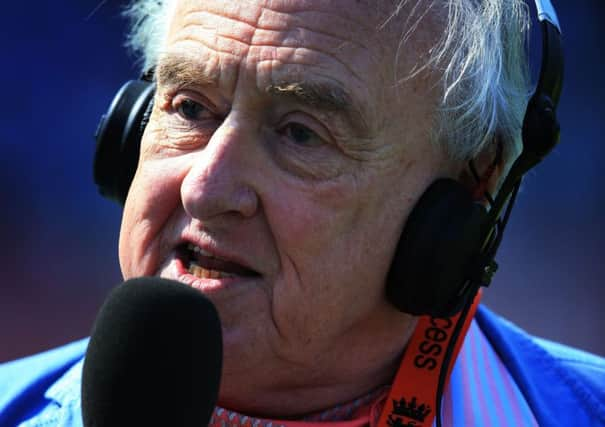Lost for words: After a record innings, BBC's Blofeld is finally run out


The ripened delivery and eccentric vocabulary of Henry Blofeld - Blowers - has been the signature tone of Test Match Special for 45 seasons - almost as long as Radios 3 and 4 themselves - but, as he noted, “all good things come to an end”.
He wanted to leave, he said, early enough for listeners to ask why he had gone and before they demanded to know why he hadn’t.
Advertisement
Hide AdAdvertisement
Hide AdAt 77, and despite remaining “keener than mustard”, he found the work harder than he used to, he added. His eyesight is said to be deteriorating and he has, on occasion, mistaken one player for another. “Listeners will now be relieved to know that their chances of being told the right name of the fielders at third man and fine leg have greatly increased,” he said.
Eton educated, the son of a Norfolk landowner and brother of a High Court judge, he was born into a Wodehousian world whose language still permeates his commentary. His father’s friend at Eton was the author Ian Fleming, who used the surname for one of James Bond’s nemeses.
Blofeld had been a gifted cricketer, at one time captaining Eton, but a traffic accident while riding a bicycle curtailed his career. Nevertheless, he went on to play 16 first-class matches for Cambridge University, and after embarking on a career in print journalism and while covering a Test in Bombay, he came close to being picked as an emergency batsman for England.
He spent a decade in print, and had a spell as an ITV commentator in the 1960s, but it was radio that he had been born to do, and where his florid style found its natural home. The extended and open-ended airtime of Test Match Special allowed his imagination to run wild, as he addressed all and sundry as “my dear old thing”, and extemporised as often on cakes brought into the commentary box as on the cricket.
Advertisement
Hide AdAdvertisement
Hide AdHis innings on TMS was longer than that of John Arlott (34 years), Brian Johnston (27 years) and even its original commentator, EW Swanton (37 years). Today, as his broadcasting life flashed before him, one highlight stood out.
It was at Headingley in 1981 that Ian Botham’s unbeaten 149 and Bob Willis’ eight for 43 secured England a thrilling 18-run Ashes victory. “I’m told I caused several car crashes on roads in England as people were celebrating,” he said. “I hope that’s not true.”
Blowers’ voice had been heard less often in recent years. In 2005, on the week before Christmas, 65 MPs signed an early day motion in the Commons, deploring his omission from the team covering that winter’s tour of Pakistan, and urging the BBC to remember that “TMS’s special place in Great Britain’s affections comes from the individual character of its commentators”.
BBC colleague Jonathan Agnew, who has shared the broadcasters’ box with Blofeld for 26 years, and whom Blowers nominated as “the best of the lot”, said: “I’ll miss his enthusiasm, his company, his chaos. Henry is one of those characters that really set up Test Match Special.
Advertisement
Hide AdAdvertisement
Hide Ad“It’s the legacy of people like him who in the 70s and 80s really developed this style of programme that people have been trying to copy ever since, including me. They were enormous characters who were also outstanding broadcasters.”
The man himself was sanguine. “I hope some will be sad that they will now hear less about the lifestyles of pigeons, seagulls, and helicopters, although I fear the general feeling will be one of huge relief,” Blofeld said.
“Now, I shall be able to come to the cricket without worrying about who is lurking down at third man. I shall also be able to have a drink without feeling I am being politically incorrect. And hallelujah to that!”